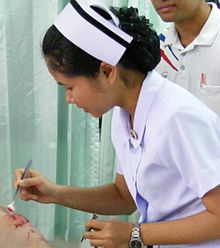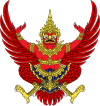Women in Thailand
 A female nurse in Thailand | |
| General Statistics | |
|---|---|
| Maternal mortality (per 100,000) | 48 (2010) |
| Women in parliament | 15.7% (2012) |
| Women over 25 with secondary education | 29.0% (2010) |
| Women in labour force | 63.8% (2011) |
| Gender Inequality Index[1] | |
| Value | 0.359 (2019) |
| Rank | 80th out of 162 |
| Global Gender Gap Index[2] | |
| Value | 0.710 (2021) |
| Rank | 79th out of 156 |
| Part of a series on |
| Women in society |
|---|
 |


Women in Thailand were among the first women in Asia who were granted the right to vote in 1932. They are underrepresented in Thai politics.[3][4] Yingluck Shinawatra, a woman, was prime minister from 2011 to 2014. The roles of women in Thailand's national development has not yet been fully established. Factors that affect women's participation in the socio-economic field include "inadequate gender awareness in the policy and planning process" and social stereotyping.[5]
Politics[]
Despite the absence of legal limitations to women participating in the political arena in Thailand, the factors that have impeded the rise of women in politics include structural barriers, cultural impediments, lower educational attainments, lower socioeconomic status,[5][6] and power-sharing issues with the opposite sex.[5] It was only on 5 June 1949 that Orapin Chaiyakan became the first woman to be elected to a post in the National Assembly of Thailand (specifically, the House of Representatives.[3][4])
The first female army officer to be elected to political office in Thailand was Lieutenant Colonel Thita Rangsitpol Manitkul, (born Thitiya Rangsitpol, 8 November 1966). She is a Thai politician and former member of the House of Representatives who served in the House from 2001 to 2005.
Business[]
Thailand's female population constitutes 47% of the country's workforce, the highest percentage of working women in the Asia-Pacific region. However, these women are also confronted by hiring discrimination and gender inequality in relation to wages due to being "concentrated in lower-paying jobs".[5][6]
Marriage[]
According to the National Statistical Office of Thailand, female Thais marry at an earlier age than male Thais, and 24% of Thai households have women identified as "heads of households".[5]
Thailand outlawed marital rape in 2007.[7][8]
The evolution of women's rights[]
In Thailand, women's rights according to labor laws require that men and women get paid for the amount of work they do. In 1974, Kanitha Wichiencharoen became a founder of The Association for the Promotion of the Status of Women (APSW), an association made up of both women and men, who campaigned to revise and amend laws to provide better protections for women and children.[9] In the 1977 constitution of Thailand women were required to receive equal rights and protections. However, some inequalities remain in the law. There are no laws prohibiting women from holding office however there are very few women holding office. The biggest problem for gender inequality is when it comes domestic violence and trafficking. Sexual harassment became illegal in 1998, but there are few reported cases and very few that are prosecuted because of the difficulties involved in proving a case. Domestic laws are still to be enacted in the constitution and the requirement for evidence of domestic abuse makes it nearly impossible to prosecute. Traditionally, a girl's education took place mostly in the home, coupled with domestic chores, while boys usually went to a Buddhist monastery for education. Education overall for business and careers is lacking in Southeast Asia.[10]
See also[]
- Sex trafficking of women and children in Thailand
- Thai people
- Thailand women's national handball team
- Thailand women's national rugby union team
- Thailand women's national football team
- Thailand national women's cricket team
- Thailand women's national volleyball team
- Violence against women in Thailand
References[]
- ^ "Gender Inequality Index" (PDF). HUMAN DEVELOPMENT REPORTS. Retrieved 26 October 2021.
- ^ "Global Gender Gap Report 2021" (PDF). World Economic Forum. Retrieved 21 December 2021.
- ^ a b Sopchokchai, Orapin. Female Members of Parliament, Women's Political Participation at the National Level Archived 2011-07-24 at the Wayback Machine, Women's Political Participation in Thailand, TDRI Quarterly Review, Vol. 13, No. 4, December 1998, pp. 11-20
- ^ a b Iwanaga, Kazuki. Women in Politics in Thailand Archived 2012-03-17 at the Wayback Machine, Working Paper No. 14, Centre for East and South-East Asian Studies, Lund University, Sweden, 2005
- ^ a b c d e Key Figures, Gender Statistics, Social Statistics Division, National Statistical Office, Bangkok.[not specific enough to verify]
- ^ a b Women's rights situation in Thailand[full citation needed]
- ^ "Thailand outlaws marital rape". The China Post. Agence France-Presse. 2007-06-22. Archived from the original on 2014-01-11. Retrieved 2013-08-17.
- ^ "Thailand passes marital rape bill". BBC News. 2007-06-21. Retrieved 2013-08-17.
- ^ Falk, Monica Lindberg (2007). Making Fields of Merit: Buddhist Female Ascetics and Gendered Orders in Thailand. Copenhagen, Denmark: NIAS Press. pp. 207–208. ISBN 978-87-7694-019-5.
- ^ Thailand Culture http://www.everyculture.com/SaTh/Thailand.html[permanent dead link]
Further reading[]
- Macan-Markar, Marwaan. Battered Women, No Longer Alone, Rights-Thailand, ipsnews.net, November 24, 2005
- Praparnun, Yada Gender Sensitivity & Accountability in Thai Government Policy Formulation, Implementation & Evaluation from an Historical Perspective, Paper for presentation at the IAFFE 2009 conference in Boston, USA
External links[]
| Wikimedia Commons has media related to Women of Thailand. |
- Women in Thailand
